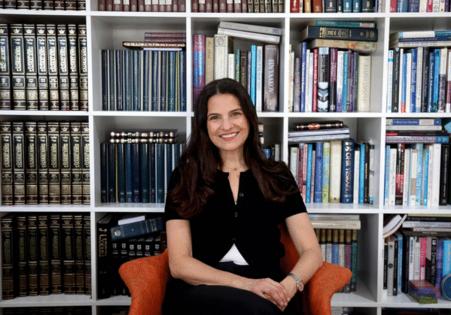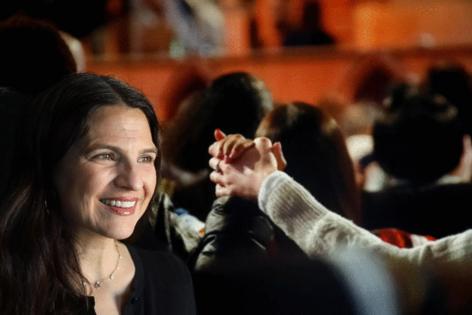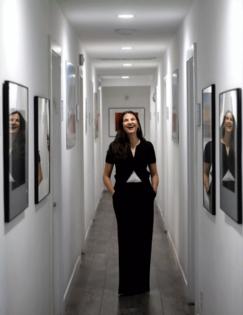'Self-annihilation?' LA rabbi wants to heal a 'world on fire'
Published in Religious News
LOS ANGELES — She was a clever girl, a daughter of retailers, who thought she had been born too late. The civil rights and anti-war movements of the 1960s inspired her. But Sharon Brous grew up in the age of Reagan, hedge funds and indifference. By the time she reached rabbinical school, Brous had many questions. All of them big and centering on how the Torah could mend a modern world of wars, poverty, racism and spiritual despair.
Brous wanted to draw sacred texts into immediate action to heal suffering. “The choice I had made to dwell in the past of ancient wisdom and my Jewish tradition,” she said of her years at the Jewish Theological Seminary, “had actually made it so that I was complicit in whatever horrors were unfolding in the world because I wasn’t doing anything to stop it.”
That may have been a harsh judgment for someone then in her 20s, but Brous has emerged as one of America’s leading Jewish voices. Her sermons on human rights and social justice are at once a compassionate and fierce plea for a planet in disarray. The growing congregation she founded in Los Angeles in 2004, known as IKAR, is recasting Jewish life in a mission of shared purpose, whether helping a friend in a time of grief or responding to genocide in Darfur or homelessness in Southern California.
“You cannot build a loving community out in the world unless you build a loving community inside,” says Brous, 50, who was raised as a Reform Jew. “I’m not interested in the denominational question. I want people who are really curious about what it means to be a Jew and a human being in a world on fire.”
Brous has been most provocative — she has received death threats over the years — in her condemnation of Israel’s right-wing government and its treatment of Palestinians.
“Supporting Israel’s right to protect and defend itself,” she said in 2012, “does not diminish the reality that the Palestinian people are also children of God whose suffering is real and undeniable.” In a Yom Kippur sermon last year, just days before Hamas’ Oct. 7 attack on Israel, Brous said “the marriage of messianic fervor” of Israel’s radical religious right with “state power is a recipe for extreme violence, abuse of power, and ultimately, I am afraid, self-annihilation.”
Such sentiments are common among many American Jews and on the Israeli left, which spent most of last year in street protests against the government of Prime Minister Benjamin Netanyahu. But it was bold for Brous to address Jewish extremism and Israeli occupation of the West Bank on the holiest of Jewish days. “That is Sharon Brous’s superpower. She is fearless,” said Shifra Bronznick, a women’s rights activist who works for social change. “The Jews are obsessed about not wanting to look bad to the world. She’s saying in public what we want to talk about in private.”
American-born Israeli writer and scholar Daniel Gordis once accused Brous of betraying Israel while peddling “ethical and emotional confusion.” But her long opposition to Israeli policies fits her theological activism and interrogation of a present that is repeating the sins of the past. That sets her at odds with more traditional Jewish leaders — most of them men — notably when Brous challenges the old ways, as she did in a 2016 Ted Talk when she admonished religious institutions for “holding onto jealously guarded doctrine that’s completely and wildly out of step with our contemporary reality.”
Brous is too progressive for some, especially in a disorienting age of recrimination and divisive outrage. A few politically conservative Jews over the years left IKAR. “She sees politics as Torah, but I don’t,” said David Wolpe, Emeritus Rabbi at Sinai Temple who has known Brous for 30 years. “She and others like her conflate liberal politics with religious mandates. We’ve hashed this out a billion times. I’m a dissenting fan.”
He added that many synagogues, such as Sinai Temple, the largest Conservative congregation in Los Angeles, serve people from diverse political persuasions: “We’re Microsoft. Sharon’s Apple,” said Wolpe. “Our message has to run on different machines. Sharon’s message is seamless. Her community embraces and reflects her message. The community is made in her image. She’s had a deep influence on other communities across the country. She’s a female rabbi, not an old man with a beard, and that amplifies the message.”
...continued
©2024 Los Angeles Times. Visit at latimes.com. Distributed by Tribune Content Agency, LLC.
















Comments